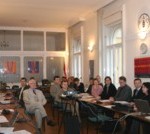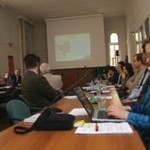 As a station of the procedure started in Vienna in December 2004, the scientific body of GOFOR met in Budapest on March 2, 2007. The objective of the meeting was to introduce and discuss the actual situation of the International Convention on the Carpathians and the Balkans, as part of multilateral international forest policies, as well as to introduce and discuss the results of the GOFOR EU research program on national forest analysis.
As a station of the procedure started in Vienna in December 2004, the scientific body of GOFOR met in Budapest on March 2, 2007. The objective of the meeting was to introduce and discuss the actual situation of the International Convention on the Carpathians and the Balkans, as part of multilateral international forest policies, as well as to introduce and discuss the results of the GOFOR EU research program on national forest analysis. The research titled “New Modes of Governance for Sustainable Forestry in Europe" was initiated by the University in Vienna.
On behalf of the organizers the participants were welcomed by Mr Endre Schiberna, Western-Hungarian University and the meeting was opened by Ms Maria Kadlecikova, Representative of the FAO Sub-Regional Office for Central and Eastern Europe. She said to the participants that they are hosted not only by the Hungarian capital but by the European capital of the FAO which will be massively extended in the near future. As we have reported before the FAO Regional Center for Europe, Asia and Africa will soon move to Budapest.
Ms Kadlecikova drew the attention to the challenges waiting for forestry in connection with nature protection, hunting and publicity. In addition to this, the economic requirements should be met as well.
During the research including 10 countries, 17 case studies were prepared covering the comparison of national forest programs, the institutional changes, the nature protection programs, the realization of Natura 2000, the rural development policy and the questions regarding sustainable development.
 In the course of the research, the sometimes ambiguous relationship between the government and the professional management, the cooperation and the reasons for possible resistance are analyzed. Also the management procedures initiated by the government and their changes are reviewed.
In the course of the research, the sometimes ambiguous relationship between the government and the professional management, the cooperation and the reasons for possible resistance are analyzed. Also the management procedures initiated by the government and their changes are reviewed.
Mr Harald Egerer on behalf of UNEP, United Nations Environment Programme reviewed the political procedure of the Alps, Carpathian and the Balkan Conventions from the UNEP's point of view. One important element of the work is the convention on the mountainous forests of the Alps, guaranteeing the cooperation in order to protect mountainous forests and to preserve the natural conditions and the balance among the protection, social and economic functions of the area.
The first conference of the Carpathian Convention was held in 2006 in Kiev where more than 200 participants, 50 civil organizations and 5 ministers took part in elaborating the agreement.
Based on sustainable development the convention guarantees the conservation of biodiversity, the protection of endangered species and the water base as well as the sustainable development of agriculture and the preservation of cultural heritage.
Mr Davide Pettenella, researcher of the Padua University spoke about the Alps Convention saying that since the first meeting in Salzburg in 1991 they could go ahead in several issues. The first international agreement was concluded after 4 years. Altogether 12 agreements were made, despite of the fact that the participating countries are involved in the agreement in a different way and they joined to reach different goals.
The agreement on mountainous forests was among these agreements. They are only frame agreements excluding quantitive data and sanctions. The agreements are focused on the protection functions: protection against pollution, protection of natural values and the rural areas, the agriculture in the mountains and the utilization of water.
It was drawn as a conclusion that a permanent secretariat is of key importance in the work and it is also important to involve the civil society in the procedure. He emphasized that in the future new areas should also be included into the procedure.
The public access, the question of hunting and the collection of non-wood products should be regulated as well. The compensation of social functions is also an important task.
As a new possibility for cooperation he talked about forest inventories, the windthrow and the forest fires, the wood market, the proof of origin and the fight against the climate change.
He talked about the biomass as a new conflict area and he added that we are at the beginning of a long procedure and it is too early to see the impact of the Alps Convention.
Mr Volker Sasse, Forestry Officer of the Sub-Regional Office of the FAO talked about the role of international organizations in creating and realizing the agreements. He drew the attention to the changes in the utilization of forests. In this respect there are very strong local differences in the East and in the West. In some regions forests have different economic, social and protection functions.
At the same time the forestry policy framework is changing as well e.g.: due to privatization. The working area and functions of forestry authorities are changing, too. New organizations, institutions appear in forest policy and in the forest management.
Forest land use will have to face bigger and bigger difficulties as to how social and protection expenses can be covered by the income from wood products.
It would be desirable if society could accept the three functions of the forest in balance and at equal values.
He said that the lesson learned is that the social and protection functions in the traditional forest organizations in Eastern-Europe should be strengthened, the contact with the EU institutions should be improved and the values of the biodiversity, rural values, the agricultural and forestry management should be harmonized as well.
In the end he emphasized that the initiatives should be made by the member countries and that we all are part of a learning procedure and the frames of forest policy are very flexible.
 As an example he cited the windthrow in Slovakia where the standpoints of the greens and the foresters significantly differed from each other: the greens wanted to leave all the trees there and the foresters wanted to take all of them. There is no international rule which can be applied to this situation. Finally they arrived at a compromise.
As an example he cited the windthrow in Slovakia where the standpoints of the greens and the foresters significantly differed from each other: the greens wanted to leave all the trees there and the foresters wanted to take all of them. There is no international rule which can be applied to this situation. Finally they arrived at a compromise.
Mr Vlatko Andonovsky, assistant professor of the University of Skopje, colleague of the Balkan Foundation for Sustainable Forestry talked about the experience gained with regard to the Balkan Convention. In the beginning he said that with the exception of Greece, in the last 20 years people in the region (South-East Europe) lived under very insecure conditions, the countries were divided by wars, economic collapse and national conflicts. The Balkan mountains are extended through the borders of 8 countries. The biodiversity is unbelievably high, but the poverty is very common among the population and the desolation is typical of the area. Within the Balkan Convention the countries cooperate in order to protect the biodiversity, in the field of agriculture and rural development, forestry, water management and to preserve the traditions and cultural heritage.
He also said that there is a big economic press on the forest sector that is the reason for illegal wood production. It is expected that the introduction of proving the origin will help to take further steps in this field. He mentioned that cultural, musical and sports events are also organized by them.



